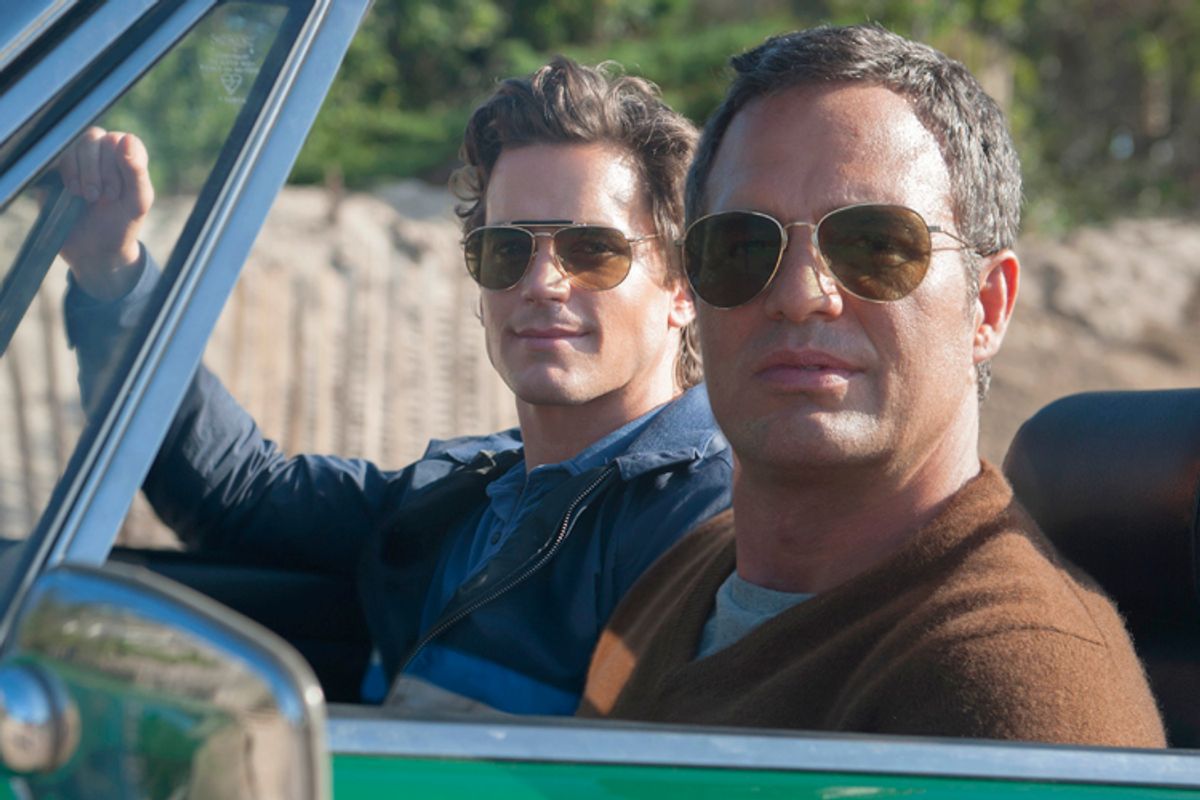There's perhaps no genre quite as mixed as the HBO movie. Some are high-quality but seem more apt for box-set gifting on Father's Day than for actual viewing ("Band of Brothers," "John Adams"). Some are perfectly fine for a tune-in but seem airily inconsequential, a would-be movie script that didn't clear the bar for studio funding but, with a star on board, could definitely garner an Emmy ("Phil Spector," "Game Change," "Mrs. Harris"). And then some -- a select few -- take advantage of the intimacy and solitary nature of television viewing in a way that movies, by their nature, cannot.
"The Normal Heart," airing this Sunday on HBO, is one of those. It's probably an amateurishly made movie in parts, but that's beside the point, because it's great television, and the best movie HBO has broadcast since the similarly sentimental "Mildred Pierce." For something this watchable and moving, one's willing to forgive a lot.
The film is an adaptation of Larry Kramer's play, which was written in the early 1980s and depicts Kramer's, and others', own work in the early fight against AIDS, back when the disease was known only as a mysterious gay cancer and when the president, a cosmopolitan Californian with gay friends, refused to speak its name aloud. That the play, and its adaptation, both feature lengthy and sometimes didactic politically minded monologues about gay rights is kind of revelatory. The movie follows one Ned Weeks (played, quite well, by Mark Ruffalo), a fellow we first see declining to doff his shirt at a pre-AIDS Fire Island beach party. Weeks is uncomfortable with other men but very comfortable with the notion of himself -- politically, at least -- as gay, and quickly becomes involved in a fight that hadn't previously existed at all.
That Fire Island beach party, which starts the film, presents, at once, the best and worst of "The Normal Heart," directed at great personal expense by Ryan Murphy after years during which Barbra Streisand, who held the film rights, reportedly refused to move forward. Murphy knows from TV: He has an Emmy for directing "Glee," and his "American Horror Story" keeps on collecting acolytes. The anarchic, childlike spirit of early "Glee" infuses the opening scene in "The Normal Heart," in which seemingly throwaway details, tossed off in vamping conversation between Weeks and friends played by Jonathan Groff and Taylor Kitsch, actually convey a great deal. And the luridness of "American Horror Story" rears its head as Groff's character, amid the idyll, begins to cough, and then collapses; later, Ruffalo's character happens upon a ménage in the Fire Island woods that looks like some twisted vision of Eden.
It's through these two sets of skills -- "Glee's" knack for portraying communities coming together, and the "AHS" eye for the horrific -- that Murphy makes a credible movie. When he indulges too far, it's in overselling the terror of his story. To a generation that didn't live through the AIDS crisis and to a generation that did, the telltale lesions are upsetting for entirely different reasons. They say enough -- and two scenes, one in a hospital and another on a subway car, in which the camera careens around and the colors go super-saturated, do far too much to hammer us with the horror of AIDS.
That's not to say the rest of the movie is subtle. From its obtrusive musical score to its recurring insert shots -- of a chest being shaved early on, of a card marking a deceased AIDS patient getting placed in a drawer -- "The Normal Heart" is baroque. But it's earned the right to be, on the basis of its subject matter and of the universally strong quality of its performances. A poorly acted "Normal Heart" would be the worst sort of camp, but the actors' performances convince us, throughout, that we're in sure and steady hands, no matter how much the lights and colors change. Insofar as Emmys matter (they don't), Mark Ruffalo is almost certainly going to win for his performance. It's not easy to be a prophet, not least when one is running up against perpetual opposition, and Ruffalo shows us a man who's at once sympathetic and very difficult to live with. Julia Roberts, continuing in her mid-career supporting-actress mode, is fine as a crusading doctor; better still are Matt Bomer, never before allowed a chance to do something as good as his AIDS-stricken lover of Ruffalo's character, and Jim Parsons, who is as funny as he is in "The Big Bang Theory" but here is able to put his buoyant energy to work against a backdrop of something real.
Last Memorial Day weekend, HBO debuted "Behind the Candelabra," a studio-quality movie (one that played at Cannes, for heaven's sake!) that the studios turned down. "Candelabra" was beautifully made and had absolutely nothing to say. "The Normal Heart" would never work as a theatrical movie -- it's, frankly, 20 minutes too long, and not nearly as studiously tasteful in its address of AIDS as the Oscar-bedecked "Dallas Buyers Club," which portrayed AIDS in the '80s as a problem that hadn't been solved just because a straight man hadn't put his mind to it yet. But I dare the viewer of "The Normal Heart," whatever its flaws, not to cry during the oddly prescient scene in which Bomer's and Ruffalo's characters are unofficially wed. Yes, it's manipulative, but if "The Normal Heart," with its flashy cinematic style and accomplished performances, is manipulating you, it's in the service of memorializing those on the front lines of the AIDS crisis. And that is something worth remembering.



Shares